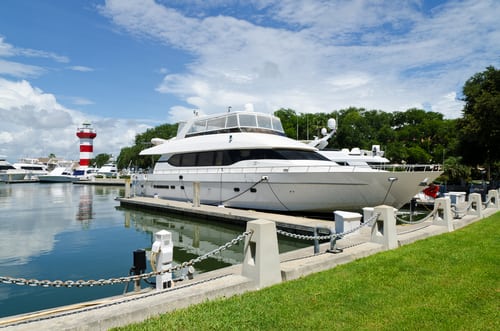Marine Salvage
Hurricane Irma Claims

Maritime Salvors: Now that it is time to do the maritime salvage work after Hurricane Irma hit I am contacting everyone and making sure they make this easier to get paid in the long run. Some of you will remember the extensive salvage work which arose from the 2004 and 2005 hurricane seasons. That’s Charley, Frances, Ivan and Jeanne in 2004 and Katrina in 2005. Hundreds and hundreds of boats were damaged and sunk in Florida in 2004, in Miami, Ft. Lauderdale, the Florida Keys, Key West and over on the West Coast in Marco Island, Naples, and near Ft. Myers. It is accurate to say that there was uncertainty in many of those marinas and coastal sections as to how everyone was going to get paid, how much they were going to get paid, and by what insurance company.
Not every job is going to be a sure thing.
Here are a couple of things which can help you in the long run. Before I get to that let me ask: Is $5000 worth 5 minutes of your time? Good. It takes 5 minutes to make sure you have the information you will need to give you the best shot at getting paid for your work.
Important Information That You Need for Maritime Salvage

To the best of your ability BEFORE YOU START WORK ON A VESSEL make sure you have
- Claim Number. (This is the most important piece of information. The claim number means the adjuster has probably spoken with you and given authority to move ahead.)
- Biographical information of the vessel owner. (Name, address, phone number. Make sure this is the OWNER of the vessel, and not just some officer in a company which owns the vessel. It’s OK to get that guy’s information but find out if they truly own the boat or a corporation owns it. If it’s the Captain of the vessel, that’s good enough in most instances. He has authority to speak for the vessel in almost 100% of the salvage instances.)
- Identification information of the vessel. Paramount. If I have to arrest the vessel for you, or sue the owner, we have to have the correct information to place before the judge. Not enough information, and the judge will not authorize the arrest warrant.
- Name of vessel.
- Make.
- Year.
- Length.
- USCG documentation or FL numbers if known.
- Hull ID number–if you can get it.
- Other important things to have.
- Signature of the owner or insurer authorizing you to proceed–before you begin work. (These guys will try to rip you, if you don’t have this.)
- Agreement on price in writing before you begin if possible.
- An attorney’s fee provision in your salvage form, signed before you start the work.
If I have to go to fight for you to collect, you can help yourself greatly by getting the most information, getting authorization in writing (even an email is OK) to begin the work, and a written understanding on how you are going to get paid. The attorney’s fee provision can be as simple as: “The undersigned agrees to pay in full all charges including attorneys fees and costs should collection become necessary”.
It only takes about 5 minutes to get the right information, authorization, and commitment from the insurer on how you will get paid. You have seen that if the insurer cannot agree with you beforehand on how you will be paid, then the insurer is likely going to be a hassle after you complete the work. I strongly recommend getting the authorization from the insurer, in writing, before you start the work, because when the insurer later figures out they don’t want to pay the owner because it was “Act of God” or some other excuse, I can fight the insurer for you on that.
Don’t forget that many of the salvors working around the Keys and Miami and Naples specifically did not get paid for their marine salvage work. Some of this was because there was insufficient documentation, or the salvor moved forward without obtaining written–provable–authorization from the insurer. Don’t get caught in this trap. There are going to be plenty of Hurricane Irma insurance denials. Get the most information before you begin the maritime salvage.
We are ready to fight for you. Call me directly at the 888-BOATLAW number if you are on-site or just have any questions.
What Is Salvage?
Salvage, is the voluntary rendering of assistance to a vessel that is in some degree of marine peril, when the service successfully assists the vessel in some way.
There Are Three Elements Required to Make a Claim for Salvage.
- A marine peril
- Service voluntarily rendered where not required by an existing duty
- Success in whole or in part in saving the vessel or contribution to such success.
The “ Sabine”,101 U.S.(11 Otto) 384,25 L.Ed.982 (1879);
Notice the date on that court case, “1879”. Much of the present salvage law comes from hundreds of years of court decisions and customs. In the old sailing days –where there were no cell phones, VHF radios, or Epirbs—the law developed that if the crew of one vessel assisted a vessel in distress, then the assisting crew would be rewarded handsomely. The same is still true today.
The economic principle is that everyone benefits from paying salvors a generous award. The vessel owner benefits because his vessel is not lost or further damaged. The vessel’s insurer benefits because it does not have to pay out a total loss. The salvor benefits when he is paid for his meritorious service. The taxpayer benefits when the U.S. Coast Guard does not have to spend its resources assisting vessels where those services can be accomplished by salvors.
Scenarios Involving Salvage Services:
- Sinking (or partial sinking) due to collision, water ingress by thru-hull fittings, weather, equipment/motor failure, etc.
- Complete submersions.
- Vessel grounded on a shoal, beach, or jetties.
- Vessel on fire.
- Vessel lost power and/or steering in navigation.
- Vessel abandoned in navigation.
- Others.
What Salvage Is Not:
Salvage is not towing. Towing is simply the expediting of a vessel from point A to point B for the sake of convenience. While it can be argued that a vessel which ran out of gas, or one with a dead battery, might be subject to a salvage, the courts just do not usually see it that way.
Also, there is some push—mostly by insurance companies—to say that a “soft grounding” is not a salvage. While this may be technically and legally wrong, again the courts do not usually find that soft groundings form the basis for a salvage award. However, if a vessel is sitting on its running gear and is bouncing up and down in the waves—on a supposed “soft grounding”–that condition may support a marine salvage.
Some marine towing companies also try to force their towers to not claim salvage if the grounded vessel can be pulled off with one vessel.
Know When to Claim Percentage Salvage:
You do not want to do a salvage and then incorrectly make the claim. Things you say to the owner, adjuster, surveyor, US Coast Guard, or witnesses can cost you the entire award if you are trying to make a claim based on a percentage of the vessel. You do not want to do the work and make the claim incorrectly so that the recovery is worthless. Each claim and circumstances are different. A main consideration is whether the vessel has any value. You do not have to decide how to make the salvage claim immediately.
10 Things to Know About Marine Salvage:
-
An abandoned vessel seeks assistance on her own.
-
Services cannot be forced on a vessel owner or captain.
-
If you guarantee yourself payment—in any respect—you cannot claim salvage based upon a percentage of the vessel.
-
If an owner does not have insurance, all is not lost if the vessel has a decent value. The vessel is responsible for the salvage work done.
-
A verbal agreement to provide services IS enforceable. (This negates the problem when the owner or captain will not sign a contract or invoice.)
-
You don’t have to know how much to charge for the salvage on the date of the services.
-
Two of the most important factors to know in making a salvage invoice are: 1. What is the value of the vessel, 2. What are the charges to repair the vessel.
-
Don’t overstate your claim. Nothing else damages your claim more than over-stating your demand, over-stating the danger to the vessel, or over-stating the risk you took in performing the service on the vessel.
-
Maritime law does not apply to lakes that are fully enclosed.
-
The statute of limitations on a salvage claim is only two years. Get going now! Witnesses disappear. Photos, reports, boats can disappear if you wait.
10 False Statements:
No entity has more reason to make false statements about salvage than insurers. Here are the best 10 they want you to believe kills your salvage claim:
-
You never told the owner/captain how much the cost was going to be.
-
The vessel/captain/owner could have done it themselves.
-
You never told the owner/captain it was going to be salvage.
-
There was no marine peril, or the situation wasn’t that bad.
-
It was a “soft grounding” (when vessel is actually hard aground).
-
We could have gotten [XYZ] Company to do it for $50/foot.
-
You didn’t render any assistance because the vessel situation couldn’t have gotten any worse.
-
It was just towing.
-
You asked for too much money.
-
Your claims are “fraudulent” because you over-stated the risk to the vessel, and/or the risk to yourself and crew.
What Is a Vessel Arrest:
In maritime law a vessel can be made a Defendant in a case, just as if it was a person. Instead of a Complaint being served on a person, the Complaint is served upon the vessel by a U.S. Marshal who “arrests” the vessel.
An arrest of a vessel is a suit against that vessel. Most importantly, it prevents the vessel from leaving the jurisdiction. (Until at least security for your claim is posted.) This is important when you do not know whether the vessel has insurance, or whether you will ever see the vessel again if it leaves the area.
The law of salvage is intended to encourage rescue, see Columbus-America, 974 F. 2d at 460 (quoting Hener, 525 F. Supp. at 356), and often aid must be administered quickly when ships are in peril.
***None of the foregoing is legal advice and is not meant to give legal advice. Each case is different. This is why it is important to contact us on the specific facts of your case. What you say in making the claim can greatly affect your outcome.
888BoatLaw: Your Boating Accident Attorney
When you need an experienced boating accident attorney with more than twenty years of experience handling boating accident cases, Jet Skis and boating collisions, call us at 888-Boat-Law (888-262-8529) to represent you. There is never any charge to discuss your case. You should pursue your case quickly! We will want to obtain any video, photographs, and witness identities. Also it is important that we get the vessels involved examined before they are repaired or destroyed. This is your case. Pursue it quickly!
Call Now
***None of the foregoing is legal advice and is not meant to give legal advice. Each case is different. This is why it is important to contact us on the specific facts of your case. What you say in making the claim can greatly affect your outcome.
